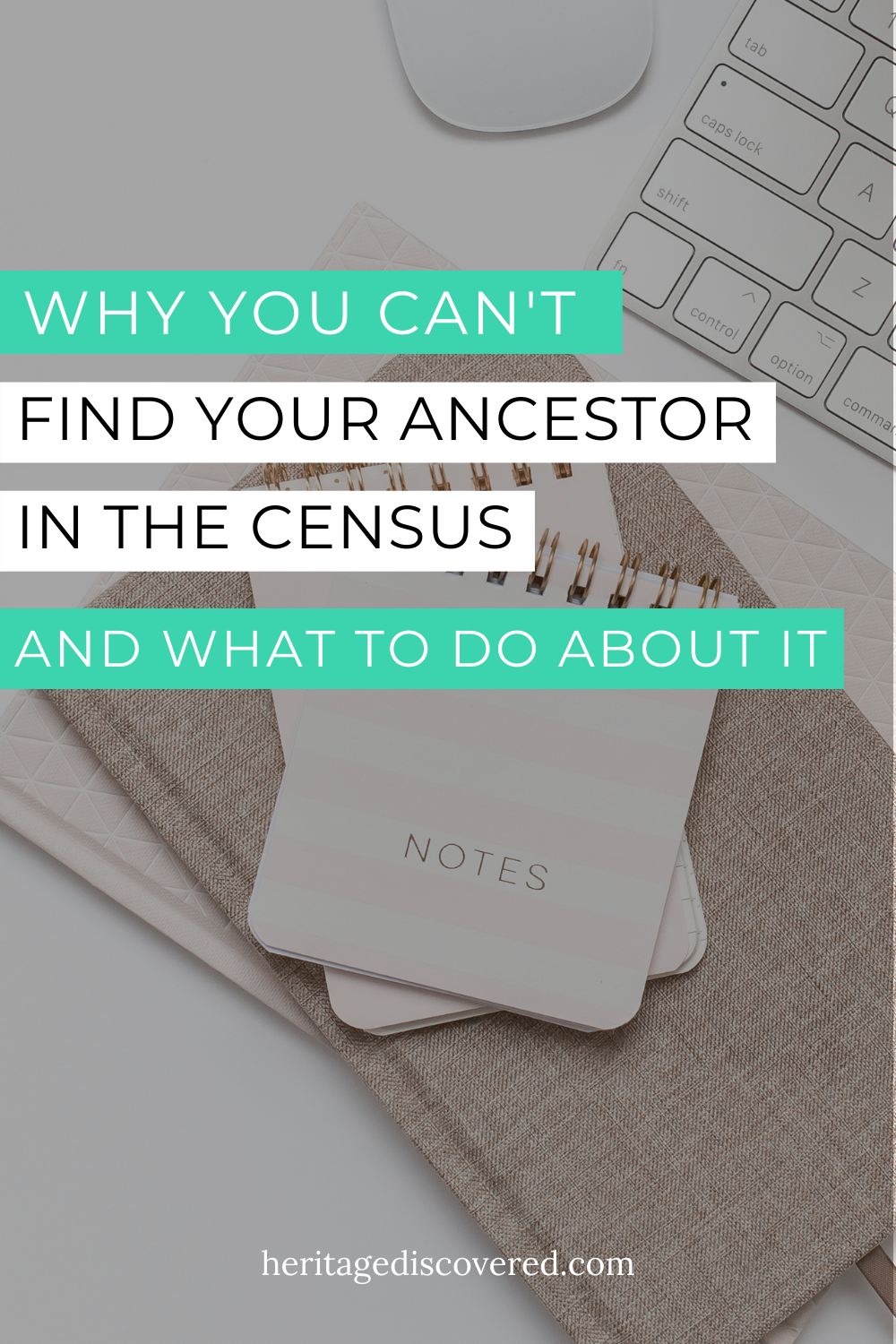Why Isn’t My Ancestor in the Census?
*This post may have affiliate links, which means I may receive commissions if you choose to purchase through links I provide (at no extra cost to you). All opinions remain my own.
Raise your hand if you’ve ever sworn that your ancestor should have been in the census for a certain place and year and that the enumerator must have missed them.
Yeah, me too! Most genealogy researchers have probably felt this way at some point.
Whenever this happens, stop and ask yourself - why would someone not appear on a census? Thinking through the possible causes for someone to be “missing” will help you troubleshoot the problem and make it more likely you’ll uncover them.
The reality is that no census has counted every single person. But they are very close.
If you can’t find an ancestor, it’s more likely than not that the census taker didn’t miss them but there is some other reason why you can’t find them.
In this article, I’m sharing 7 reasons why you can’t find your ancestor in the census, and some tips on what to do next.
Related posts:
Solve Your Genealogy Brick Wall: Review and Analyze Your Research
Solve Your Genealogy Brick Wall: How To Evaluate Your Sources
Solve Your Genealogy Brick Wall: 10 Ways To Widen Your Research Net
Solve Your Genealogy Brick Wall: How To Research A Last Name In An Area
Transcription errors
This is the number one reason people are unfindable in a census. Some records are very challenging to read and transcription mistakes are not uncommon. How many times have you looked at a record and had trouble telling letters like W and M, y and g, and s and l apart from each other. I’ve been there.
The people who volunteer to transcribe the records we find on the big database websites have the same struggles with reading handwriting. Not only is the handwriting a challenge in itself, but sometimes the image quality isn’t great, making it even harder to read. There can also be issues like people transcribing the wrong things for someone because they accidentally looked at the line for someone else.
And to be perfectly frank, some good-hearted people volunteer for transcription projects that are not in their wheelhouse. My mom’s side of the family is Asian and from Hawaii and some of the indexing for Japanese in old Hawaiian censuses can be downright confusing because the transcribers clearly weren’t familiar with Japanese names.
This can all lead to challenges with you later finding your family in those indexes.
Problems with understanding names
The census enumerator might not have been able to understand the name of your ancestor and took their best guess at spelling it. This is especially true for people that had more unique names. One of my client’s family members was named Mosie Lee. Well, I found Mosie Lee in censuses and other documents as Mozilla, Manzilla, Marella, Mozilia, and Mazzilie!
Anglicized or translated names
One of the reasons you may not be able to find your family in the census is because they changed their first or last names. This was common with immigrants, who wanted to assimilate or avoid discrimination.
Sometimes you’ll find that foreign first or last names have been translated into English on records. For example, my Boisvert ancestors were often recorded as “Greenwood” and my Veillette family became Vayette, Vyett, or Veyett. A person named Ludwig could become Louis.
They were living with someone else
If the family was having financial or other problems, children could have been sent to live with relatives or had to live with another family to work. Or a wife/widow could have moved in with a relative. This means they might not be where you’d expect to find them.
My 4x great-grandfather didn’t have a lot of money. I found that by 1850, when the older boys were in their teens, they were living with other people as farmhands. The girls all married really young.
Challenges specific to that census year
Sometimes problems came up during a census year, like what we went through trying to do the census in 2020 during the pandemic.
In 1870, New York City and Philadelphia complained that too many people were missed, and they had to do a recount, which still missed people because it happened during cold weather.
They were traveling or moved
People would travel back to their home country or to another region to visit family and friends and weren’t enumerated.
They also could have relocated. It’s actually a myth that people didn’t move around a lot back in the day. Moving between towns and states happened more often than we think. People would move for economic reasons like the chance to buy land or to cash in in on events like the Gold Rush. Increased transportation options like new railroads made it easier for our relatives to migrate. I’ve researched families that were in different states in every census (and had kids in even more places in between).
To be sure you’re searching in the right place at the right time, first put together a timeline of the known events of your ancestor’s life. Add to it anything that might have affected where they were living, such as war, droughts, or economic issues.
Then, look for every record you can find for those places, like probate and court records, vital records, deeds, city directories, and newspapers for any references to where they were living. You can use a records checklist for ideas on where to look and track what you’ve found.
They died between censuses
Ten years is a long time. And the gap caused by the missing 1890 census is of course even bigger. A husband might pass away between census years and the wife would remarry and change her name. If a wife remarried, children generally took the stepfather’s last name and there wouldn’t necessarily be a formal adoption to help you track them. Or one or both parents would die and the children would be sent to live with other people.
Search tips on how to find your ancestor in the census
It can be really frustrating when you can’t find the person you’re looking for in a census.
Here are a bunch of tips that can help you finally uncover them:
Use wildcard searches. On Ancestry and FamilySearch, you can use a * as a wildcard option to replace letters.
Search by first initials rather than the first name
Search for anglicized versions of the last name when relevant
If one of the family members has a more unusual first name, try searching only by that with no surname.
Similarly, if they lived in a smaller town or county, try searching only by their first name with no last name. Narrow down the search with a broad birth year range and place of birth as needed.
Switch their first and last names.
Get creative and be very open minded about spelling variations. Remember the Mosie Lee example above? Try many different spellings and don’t rule someone out if the name sounds like it may be impossible to be your person. Investigate every possibility.
Broaden the search area. Try neighboring towns, counties, and states.
Use other record types to pin down their location. Try city directories, tax records, deeds, and voter registration lists to track where they were living and when by year. Look at mortality schedules to see if they had died. Passenger lists can tell you if they were traveling overseas.
Look in newspaper social columns to see if you can find mentions of them moving or going out of town to visit people
Forget the indexes and search manually page by page. This is time-consuming but doable if searching a smaller area or only one enumeration district.
Try a different database. If you’re searching on Ancestry, try FamilySearch or MyHeritage, and vice versa. The indexing may be different on each.
Related posts:
How to Use Agricultural Censuses in Genealogy
Why You Need a Genealogy Research Log
How To Use Online Family Trees The Right Way
How to Strengthen Your Cemetery Research Skills to Find More Clues
Why Local History Books Are More Important Than You Think For Genealogy
Final thoughts
It’s a common issue to not be able to find your family in a specific census, but that doesn’t make it any less frustrating. There are a lot of reasons why you can’t find someone, but most often it’s because of mistakes made when transcribing. There are many simple search strategies you can try to finally dig them up!
What’s the strangest situation you’ve ever found your ancestor mislisted in a census?

